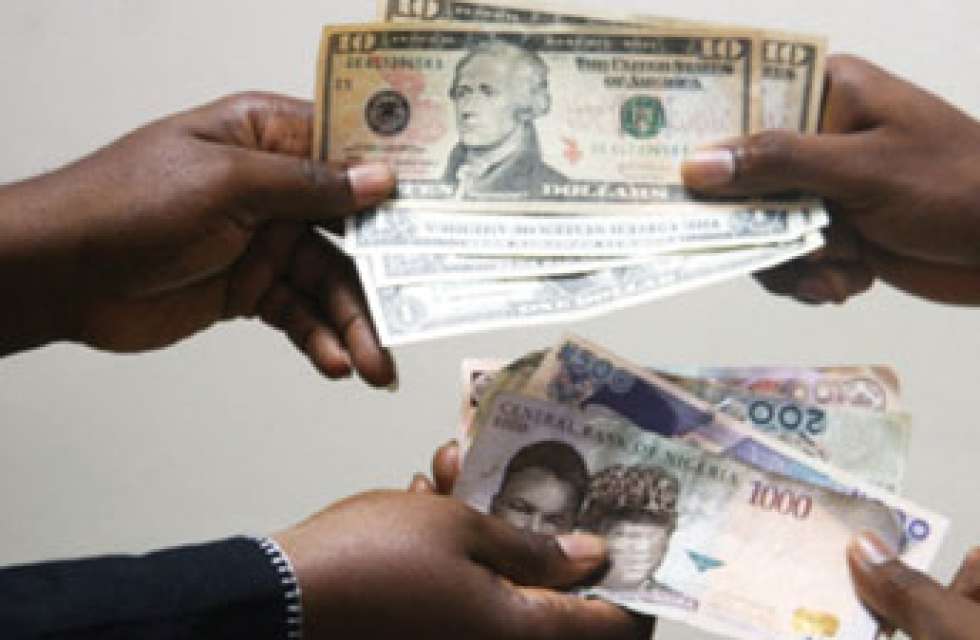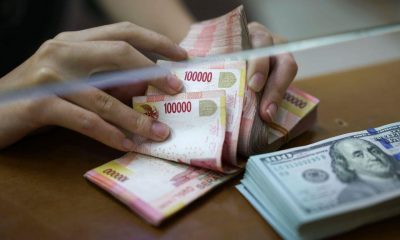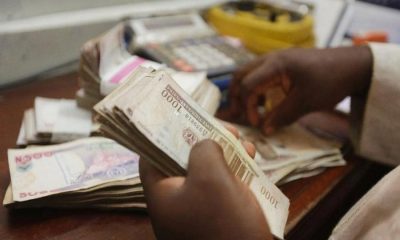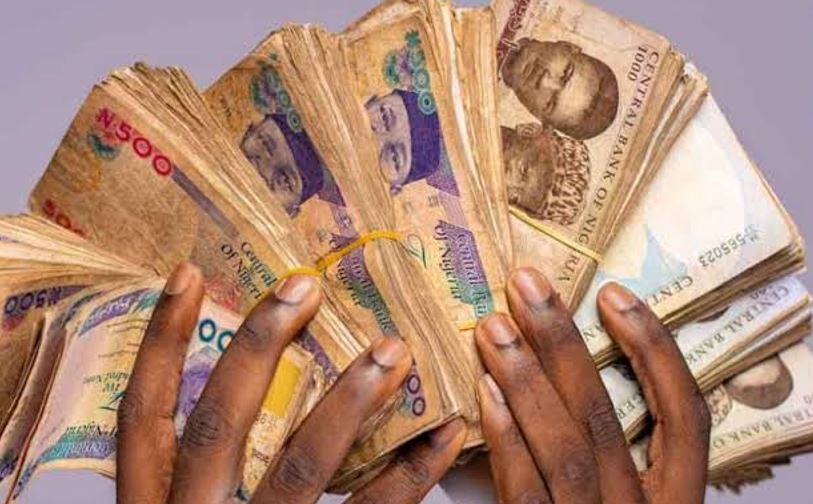Economy
Has Naira-settled OTC FX Futures Stabilized Naira Exchange Rate?

By Quantitative Financial Analytics Ltd
To stem the continued devaluation of the Naira and to breathe some air of stability into the ever-volatile Naira/Dollar relationship, the Central Bank of Nigeria (CBN) introduced some far-reaching measures at different times.
One of such measures was the launching of the Naira-settled OTC FX Futures Market. That “history making” event which commenced on June 27, 2016 made the CBN “the pioneer seller of the Naira-settled OTC FX Futures contracts on the FMDQ OTC Securities Exchange (FMDQ)”.
Before the advent of the Naira-settled OTC FX Futures, various governments in Nigeria had been tinkering with the Naira exchange rate management using different policy driven methodologies at different times.
In 1986, the Exchange Rate Liberalization Policy was introduced and with it, the Naira was devalued officially for the very first time on September 26, 1986 to be specific. From that day till today, the Naira has been heading south.
Economic and financial historians have it that Nigerian governments have tried to manage the exchange rate with the Foreign Exchange (Monitoring & Miscellaneous Provisions) (FEMM) Act of 1995, the two-way Quote System (market making) in the inter-bank FX market in 1996 and the Wholesale Dutch Auction System (WDAS) in 2006.
Unfortunately, it seems none of those worked. It is therefore not surprising that the currency futures market has been put in place as a way to “stabilize” the Naira.
It is now almost two years since the Naira-settled OTC FX Futures market was introduced and the question is ‘how far it has gone in stabilizing the Naira/Dollar exchange rate?’
Though the Naira/Dollar exchange rate continues to remain high, it is a bit comforting that the new FX currency risk exposure management instrument, (the Naira-settled OTC FX Futures), has been able to curb or curtail the speed at which the Naira depreciates relative to the Dollar. At least, for over six months the rate has remained in the N360s to the $.
When used properly, Currency Futures are a veritable instrument of managing foreign currency risk exposure. This works well when there are buyers and sellers and probably not so well when there are buyers with the CBN as the only seller.
By definition, a futures contract is an agreement between two parties where one (the buyer) agrees to buy and the other, (the seller) agrees to sell a given amount of the underlying asset or subject of the contract, at an agreed price on future date.
A futures contract entails a long position by one party and a corresponding short position by another. It does look like the CBN is the seller or the short position party in the Naira-settled OTC FX futures contracts although it is not apparent who the long position parties are.
By their nature, futures are zero sum games. Futures do not involve an initial cash flow, meaning that money does not change hands at the initiation of the contract except where commissions are charged but subsequently, it becomes apparent how much the parties to a contract will pay/receive as the price of the underlying instruments change from day to day.
The method of determining the amount payable/receivable by either party is called marking to market, (the technicalities involved in mark to market calculation will not be part of this discuss).
Market Activity
It is noteworthy to point out that the Currency Futures market in Nigeria has been very active and vibrant since inception although the momentum seems to be reducing as rates converge.
On the date that the market went live, it recoded $26.73 million in open interest. As at April 6, 2018, the open interest had increased to $3,278.43 million, an increase of 12176 percent. This underscores the extent of Nigeria’s dependence on and demand for the dollar, among other implications.
The implication of this is also that, if the CBN is the only party that holds the short positions, it means that the CBN has contracted to sell $3,278.34 million to various parties over a range of period depending on the maturity dates of the contracts.
However, the Naira-settled OTC FX Futures are non-deliverable, meaning that the CBN is not going to sell or deliver $3,278.34 million to the long position holders; rather, the CBN will pay them the difference between the contract price and the NIFEX/NAFEX rate as at the maturity date of each futures contract.
It will be recalled that the first futures contract matured on July 27, 2016, and the CBN had to pay N962.23 million to the long position holder.
For the almost two years of existence of the FX Futures market in Nigeria, 21 of such contracts have matured. Looking at the contract prices of the open trades in relation with the current exchange rate, there is indication that the CBN will be at the paying end of the contracts.
According to analysis by analysts at Quantitative Financial Analytics, the total notional value of all contracts from inception to date is $11.743 billion while total matured contracts stand at $8.464 billion, leaving current outstanding open interest at $3.278 billion.
Out of the matured contracts, the short position holders (probably the CBN) have paid an estimated $503.8 million to the long position holders, according to the analysis.
As said before, currency futures are derivatives, and derivatives are high risk instruments, if used properly, they are beneficial but when misused, they can lead to catastrophe.
To a large extent and in most recent times, the FX currency futures market has helped in stabilizing the Naira Dollar exchange rate although the decreasing momentum arising from convergence of rates may diminish its role in managing the currency risk exposure of Nigerians. We are watching
Economy
LIRS Urges Taxpayers to File Annual Returns Ahead of Deadline

By Modupe Gbadeyanka
All individual taxpayers in Lagos State have been advised to file their annual tax returns ahead of the March 31 deadline.
This appeal was made by the Lagos State Internal Revenue Service (LIRS) in a statement issued by its Head of Corporate Communications, Mrs Monsurat Amasa-Oyelude.
The notice quoted the chairman of LIRS, Mr Ayodele Subair, as saying that timely filing remains both a constitutional and statutory obligation as well as a civic responsibility.
The statutory filing requirement applies to all taxable persons, including self-employed individuals, business owners, professionals, persons in the informal sector, and employees under the Pay-As-You-Earn (PAYE) scheme.
In accordance with Section 24(f) of the 1999 Constitution of the Federal Republic of Nigeria, Sections 13 &14(3) of the Nigeria Tax Administration Act 2025 (NTAA), every individual with taxable income is required to submit a true and correct return of total income from all sources for the preceding year (January 1 to December 31, 2025) within 90 days of the commencement of a new assessment year.
“Filing of annual tax returns is not optional. It is a legal requirement under the Nigeria Tax Administration Act 2025. We encourage all Lagos residents earning taxable income to file early and accurately.
“Early and accurate filing not only ensures full adherence with statutory requirements, but supports effective monitoring and forecasting, which are critical to Lagos State’s fiscal planning and long-term sustainability,” Mr Subair stated.
He further noted that failure to file returns by the statutory deadline attracts administrative penalties, interest, and other enforcement measures as prescribed by law.
To enhance convenience and efficiency, all individual tax returns must be submitted electronically via the LIRS eTax portal at https://etax.lirs.net. The platform enables taxpayers to register, file returns, upload supporting documents, and manage their tax profiles securely from anywhere.
In keeping with global best practices, Mr Subair reiterated that LIRS continues to prioritise digital tax administration and taxpayer support services. He affirmed that the LIRS eTax platform is secure and accessible worldwide. Taxpayers requiring assistance may visit any of the LIRS offices or other channels.
Economy
NNPC Targets 230% LPG Supply Surge to 5MTPA Under Gas Master Plan 2026

By Adedapo Adesanya
The Nigerian National Petroleum Company (NNPC) Limited has said the Gas Master Plan 2026 targets over 230 per cent scale-up of Liquefied Petroleum Gas (LPG) supply from 1.5 million tonnes per annum (MTPA) to 5 MTPA this year.
The Executive Vice President for Gas, Power and New Energy at NNPC, Mr Olalekan Ogunleye, unveiled the strategic direction of the NNPC Gas Master Plan 2026, outlining an aggressive expansion drive to position Nigeria as a regional and global gas powerhouse.
Mr Ogunleye delivered the keynote address at the 2026 Lagos Energy Week, organised by the Society of Petroleum Engineers (SPE), where he detailed plans to accelerate gas development, deepen infrastructure and significantly scale domestic supply.
According to him, the Gas Master Plan targets a scale-up of LPG or cooking gas supply from 1.5 MTPA to 5 MTPA, alongside expanded feedstock for Mini-LNG and Compressed Natural Gas (CNG) projects.
“The NNPC Gas Master Plan 2026 is a blueprint to unlock Nigeria’s vast gas potential and translate it into tangible economic value,” Mr Ogunleye said.
He added that the strategy would also drive exponential growth in Gas-Based Industries, GBIs, strengthening local manufacturing, fertiliser production and power generation.
“Our renewed focus is on turning abundant gas resources into inclusive economic growth and improved quality of life for Nigerians,” he stated.
Mr Ogunleye said the plan aligns with the Federal Government’s Decade of Gas initiative and the presidential production targets of achieving 10 billion cubic feet per day by 2027 and 12 BCF/D by 2030.
Industry leaders at the event, including executives from Chevron Corporation, Esso Exploration and Production Nigeria Limited, Midwestern Oil and Gas Company Limited, Abuja Gas Processing Company and Shell Nigeria Gas, commended the plan and praised Ogunleye’s leadership in driving implementation excellence.
The new blueprint signals NNPC’s determination to anchor Nigeria’s energy transition on gas, leveraging infrastructure expansion and domestic utilisation to consolidate the country’s status as Africa’s largest gas reserve holder.
Economy
Shettima Blames CBN’s FX Intervention for Naira Depreciation

By Adedapo Adesanya
Vice President Kashim Shettima has attributed the Naira’s recent depreciation to the intervention of the Central Bank of Nigeria (CBN) in the foreign exchange (FX) market, stating that the currency could have strengthened to around N1,000 per Dollar within weeks if the apex bank had allowed market forces to prevail.
The local currency has dropped over N8.37 on the Dollar in the last week, as it closed at N1,355.37/$1 on Tuesday at the Nigerian Autonomous Foreign Exchange Market (NAFEM), after it went on a spree late last month and into the early weeks of February.
However, speaking on Tuesday at the Progressive Governors’ Forum (PGF), Renewed Hope Ambassadors Strategic Summit in Abuja, the Nigerian VP said the intervention was to ensure stability.
“In fact, if not for the interventions by the Central Bank of Nigeria yesterday, the 1,000 Naira to a Dollar we are going to attain in weeks, not in months. But for the purpose of market stability, the CBN generously intervened yesterday.
“So, for some of my friends, especially one of our party leaders who takes delight in stockpiling dollars, it is a wake-up call,” the vice president said.
He was alluding to CBN buying US Dollars from the market to slow down the rapid rise of the Naira.
Latest information showed that last week, the apex bank bought about $189.80 million to reduce excess Dollar supply and control how fast the Naira was gaining value.
The move was aimed at preventing foreign portfolio investors from exiting Nigeria’s fixed-income market, as large-scale sell-offs could heighten demand for US Dollars, intensify capital flight, and exert further pressure on the exchange rate.
Amid this, speaking after the 304th meeting of the monetary policy committee (MPC) of the CBN on Tuesday, Governor of the central bank, Mr Yemi Cardoso, said Nigeria’s gross external reserves have risen to $50.45 billion, the highest level in 13 years.
This strengthens the country’s foreign exchange buffers, enhances the apex bank’s capacity to defend the Naira when needed, and boosts investor confidence in the stability of the Nigerian FX market.
-

 Feature/OPED6 years ago
Feature/OPED6 years agoDavos was Different this year
-
Travel/Tourism10 years ago
Lagos Seals Western Lodge Hotel In Ikorodu
-

 Showbiz3 years ago
Showbiz3 years agoEstranged Lover Releases Videos of Empress Njamah Bathing
-

 Banking8 years ago
Banking8 years agoSort Codes of GTBank Branches in Nigeria
-

 Economy3 years ago
Economy3 years agoSubsidy Removal: CNG at N130 Per Litre Cheaper Than Petrol—IPMAN
-

 Banking3 years ago
Banking3 years agoSort Codes of UBA Branches in Nigeria
-

 Banking3 years ago
Banking3 years agoFirst Bank Announces Planned Downtime
-

 Sports3 years ago
Sports3 years agoHighest Paid Nigerian Footballer – How Much Do Nigerian Footballers Earn



















